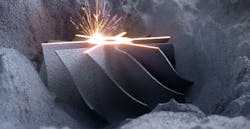QuesTek Awarded for AM Modeling Advances
QuesTek Innovations LLC, a materials research and development center, recently took the top award in a contest to improve the process, structure, and performance of metal additive-manufactured components, QuesTek’s entry was judged the Top Performer for offering "the most accurate prediction of key material properties, such as strength, elongation, and modulus of elasticity."
The contest was sponsored by the U.S. Air Force Research Lab (AFRL) and America Makes. America Makes is a public-private partnership that coordinates research and development of AM/3DP processes to increase U.S. global manufacturing competitiveness.
QuesTek has drawn over 60 projects to research metallurgy and materials issues in metallic AM. Its response to the AFRL Challenge drew on its modeling efforts in DARPA’s Open Manufacturing project with Honeywell on Ni 718Plus; a NASA STTR project on IN718; as well as QuesTek’s role in the U.S. Navy’s Quality Made program on IN625 nickel superalloys.
The AFRL Additive Manufacturing Modeling Challenge — “Macro-scale Structure-to-Properties Predictions” — sought to improve the accuracy of model predictions for metal additive manufacturing (AM), with Inconel® 625 nickel-chromium alloy (IN625) as an example. Challenge participants were provided with calibration and validation datasets needed to develop new models directly related to predicting the internal structure and resultant performance of AM metallic components.
The inputs provided to QuesTek were limited to printed component geometry and dimensions, alloy compositions, as-printed and heat-treated microstructures, surface roughness, and porosity.
QuesTek’s technical team applied Integrated Computational Materials Engineering (ICME) technologies, as well as past experience modeling Ni-based superalloys, and a proprietary yield and ultimate strength model that incorporates grain size, solid solution strengthening, and precipitation strengthening contributions; as well as a strain-hardening model that predicts a material’s strain-stress relations.
According to QuesTek, the AFRL Challenge request was timely as it had already been working to develop the modeling framework for such a predictive capability.
“QuesTek has successfully demonstrated the ability to predict microstructures and properties across a range of alloy systems in metal AM, including nickel, aluminum, titanium and steel," according to Dr. Jiadong Gong, QuesTek’s technical fellow and manager of Modeling and Software Development.
"We are aware of a significant market need for such a capability, and we are currently incorporating this into a comprehensive software package,” he continued. “This package will be able to predict AM materials property and component performance by inputting powder chemistry, machine build parameters, and subsequent thermal processing, and will enable rapid qualification of materials and components for critical applications.”
